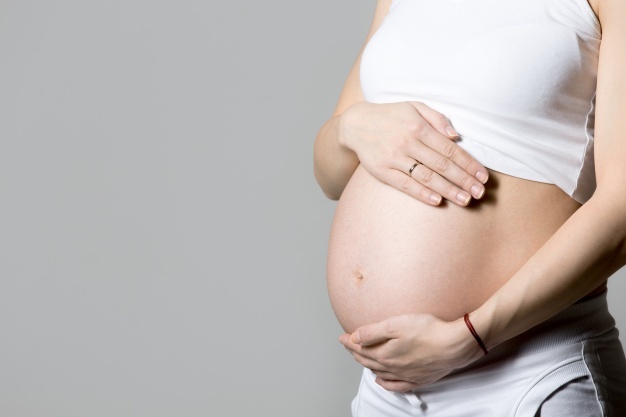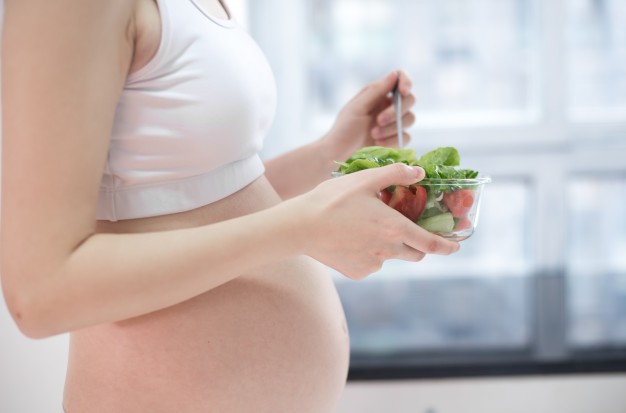As the name implies, heartburn is a painful feeling in your chest—but it has nothing to do with your heart. It occurs as the lower esophageal sphincter (LES), the muscle responsible for holding the stomach contents in place, starts to contract or leak. This causes the stomach acids to flow upwards through the esophagus.

Unfortunately, most women will have some acid reflux (or heartburn), particularly during the second half of their pregnancy. The painful feeling continues to get worse as your baby grows up. Heartburn commonly occurs after meals or at bedtime, which can range from uncomfortable to downright agonizing. Understanding the causes and preventive methods will help moms-to-be.
What Causes Heartburn During Pregnancy?
Pregnancy hormones are primarily responsible for heartburn, which plagues many mothers. High levels of progesterone allow the muscle between the esophagus and the stomach to contract. When this occurs, the enzymes in the stomach can pass up more quickly.
Adding to that, the developing child is putting pressure on both the stomach and the LES, raising the risk that acids will be forced up into the esophagus. When the growing uterus strains against the belly, it has less space to do its work.
5 Ways to Deal with Pregnancy Heartburn and Get Relief
So how do pregnant women alleviate heartburn during their pregnancy? Follow these five tips to relieve the symptoms:
Suggested Articles: Announcing Pregnancy: These Are The 15 Best Ways To Do That
Eat Smart; Reduce the Meal Portion but Eat More Often:
Overeating worsens your heartburn. There is less space for your stomach to stretch when you are pregnant. Maintaining a sensible diet can not only stave off heartburn in the short term but also during your pregnancy, so adding more than the prescribed weight adds more pressure on your belly, which may worsen your disease. Instead of three meals a day, you should have six mini-meals of no more than 11⁄2 cups (one and a half cups) of food each. Smaller food is healthier for the body to eat, helping to ease the effects of heartburn during pregnancy.
Eliminate foods that trigger heartburn:
Identify foods that increase your heartburn and remove them from your diet. Though there are no official “blacklisted” foods, typical heartburn causes include acidic foods like citrus fruits and tomatoes, oily or fried foods, spicy foods, chocolate, coffee, and carbonated drinks, and alcohol (which, as you already know, you should avoid anyway!).
Focus on liquid food, or chewing properly:
Liquid foods are less likely to trigger discomfort than solids since they pass easier across the stomach. Soups, fruit smoothies, yogurt, milkshakes, protein shakes, and puddings are all healthy choices. Look for liquids that give a lot of protein, such as milk and probiotic drinks, and try to chew the solid foods properly and slowly well, until they are almost liquefied. There is this lore that if you chew your food 32 times, you get better digestion; it cannot hurt to try. Keep in mind, though, that drinking significant quantities of fluids be it water or any other drink will make heartburn worse, as drinking can force you to swallow more air. During a meal, if you feel thirsty, take little sips between bites of food.
Suggestion for you: 5 Signs That You Are Ovulating Right Now
Sleep Smart
Eat nothing for at least three hours before bedtime to prevent overnight heartburn during pregnancy. When you lay down, it gets easier for acids in your stomach to migrate up to your esophagus, thus causing heartburn.
Raise the head of your bed by putting books under the leg of your bed, and if you are not sleeping on your left side start now; it will prevent the stomach acids from traveling up to get to the esophagus.
Several people suffering from frequent acid-reflux recommend “bedges,” these are wedge-shaped pillows that gently tilt your upper body upwards to make sure that the stomach acid remains where it belongs which is in your stomach.
Women who are pregnant also should not lay down or lean over right after dinner or any meal.
Take Antacids Mindfully
Antacids can help neutralize stomach acid and provide quick relief from heartburn. It is perfectly acceptable to get comfort from a bottle of Tums, Rolaids, or other calcium-based antacids. Too much calcium will obstruct iron absorption, so do not take Tums at the same time as your prenatal vitamin. And stay away from antacids that contain aluminum (aluminum hydroxide or aluminum carbonate), which can induce constipation and even be harmful in high concentrations.
During pregnancy, aspirin-containing remedies (such as Alka-Seltzer) should be avoided, check for salicylate or acetylsalicylic acid in ingredient lists.
Also, these small changes will prevent heartburn like wearing loose clothes as tight clothes will just add to the burden on your already crammed belly, potentially worsening acid reflux. If you are looking to get rid of heartburn, go with the loose-fitting maternity dress.
If the symptoms keep worsening or do not stop then contact your doctor.
Note: Before rushing out to the nearest pharmacy, first be sure to get your doctor’s okay before taking antacids—or any other medications—during pregnancy.

10 SIGNS OF POOR NUTRITION DURING PREGNANCY
It is very important that our diet consists of proper minerals and vitamins and especially during pregnancy times. The nutrient requirement during pregnancy is very important as it is not only required for the mother but also for the growth and development of the baby. So poor nutrition or malnutrition during the pregnancy period is very dangerous. Keeping track of the nutritional needs during the pregnancy period is a hectic job, and sometimes we end up having less or the wrong food. But ladies, through this post, we are going to help you by discussing some of the signs related to poor nutrition during pregnancy.
But before we do so, we need to understand what does poor nutrition refers to.
What is Malnutrition/Poor Nutrition?
This happens when the body is unable to get the requisite nutrients that are required for the body to function in normal circumstances. A nutrient is a composite term, and it consists of two types of nutrients; Macro Nutrients (Proteins, Carbs, and Fats) and Micro Nutrients (Vitamins and minerals). So serious deficiencies of such nutrients create a lot of problems and lead to various complications like stillbirth, premature delivery, miscarriage, defects.
But these can be prevented if you take proper steps when you see the signs of poor nutrition.
Related Article: Freezing Embryos: A Lot Of People Are Turning For This Option
1. Dental problems:
If you are suffering from recurrent tooth decay and dental problems, then it is a sign that you are malnourished or not getting the proper nutrients, especially calcium and vitamins.
2. High Blood Pressure Levels:
High blood pressure is a very dangerous sign that indicates you are poor in nutrition. It also happens due to excess protein levels in the blood, thereby endangering both the mother and the baby.
3. Osteomalacia:
It is a condition related to softening of bones where your bones become soft or brittle. This is also a sign of poor nutrition.
Suggested Topic: Announcing Pregnancy: These Are The 15 Best Ways To Do That
4. Anemia:
This happens when there is an iron deficiency in your body, which leads to fewer red blood cells leading to anemia. Lack of proper iron-enriched food leads to such problems.
5. Lack of an Appetite:
A very important sign of poor nutrition is a lack of appetite. You would not even like your favorite food or have any cravings, which indicated that there is something wrong.
6. Hair fall:
Hair fall is common, but if you are noticing that you are having excessive hair fall, this also indicates that you are suffering from poor nutrition.
7. Falling ill regularly:
When you don’t have a proper diet, your body is not able to get the proper nourishment, and especially during pregnant times, it leads to a lack of body defense mechanism and low immunity. Thereby you fall easily to several diseases that can be harmful to you and your baby.
8. Vomiting and diarrhea:
Morning sickness is common during pregnancy, but regular vomiting and diarrhea indicate that something is not right and you are suffering from poor nutrition.
9. Chance of higher infections:
When you possess a low level of nutrition, your white blood cells are unable to act as a defense mechanism for infections. Hence pregnant women with a lack of nutrition become very susceptible to infectious diseases.
10. Lack of proper productivity:
Without proper nutrition during your pregnancy, you would always feel tired and would be unable to regain your energy back to do things productively.
Also Read: How To Talk To Your Partner About Fertility Issues
Lack of proper nutrition for your body during your pregnancy can also lead to several long-term effects on your baby.
Risk of Diabetes Mellitus:
Since malnourishment also affects the baby, there are also several risks like developing type 2 diabetes.
Cardiovascular Diseases:
Malnourishment often leads to the baby developing high blood pressure and heart diseases as he grows up.
Development of Osteoporosis:
Lack of proper nutrition in your pregnancy days can lead to your baby suffering from osteoporosis, where bones become brittle and susceptible to fracture.
So, when you notice any of the signs mentioned earlier, immediately contact your gynecologist for the same. Apart from this, to prevent malnutrition or poor nutrition, try eating healthy, nutritious food which will consist of a lot of fruits, vegetables, dietary fibers, protein, fats, and carbohydrates. Also, you can take prenatal vitamins and exercise regularly. You can try some specific foods like fish, eggs, lean meat, dairy products, avocado, broccoli or dark green vegetables, sweet potatoes, and legumes.
Conclusion
Do make sure that you are having a proper diet so that you and your baby don’t suffer from any complications. Always ask your gynecologist to prepare you a proper diet chart during your pregnancy period so that you become well aware of what to eat or what to not.
Suggested Article For You
WHEN TO GO TO A DOCTOR? FROM PREGNANCY TILL BIRTH
Testing positive for pregnancy is beautiful as well as exciting. But the first thought that comes to your mind is when to visit your doctor? Here we have highlighted some points, from the beginning of your pregnancy journey to the final delivery. Read More:
![]()











